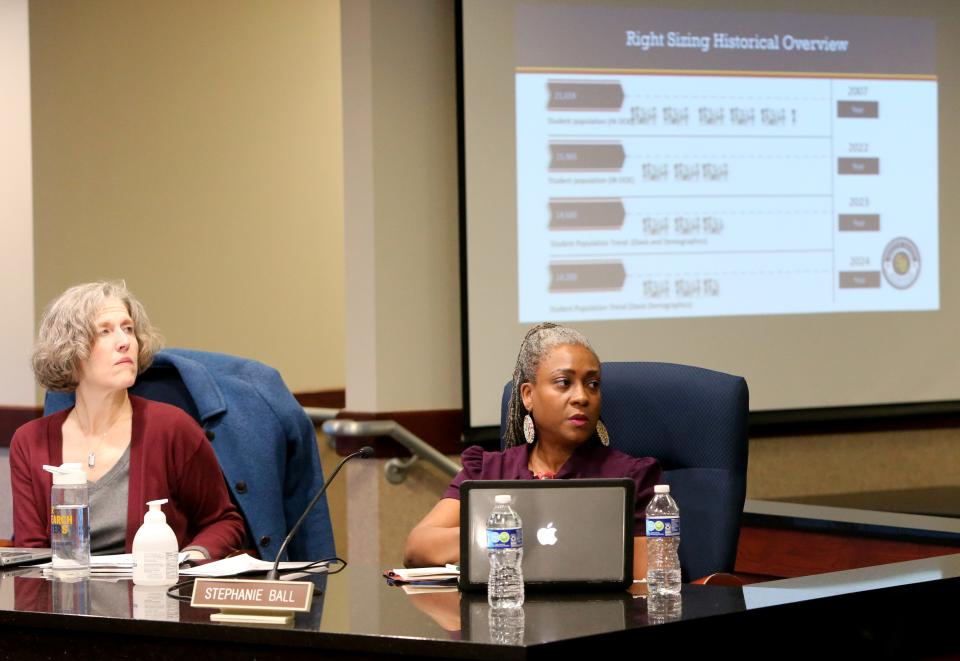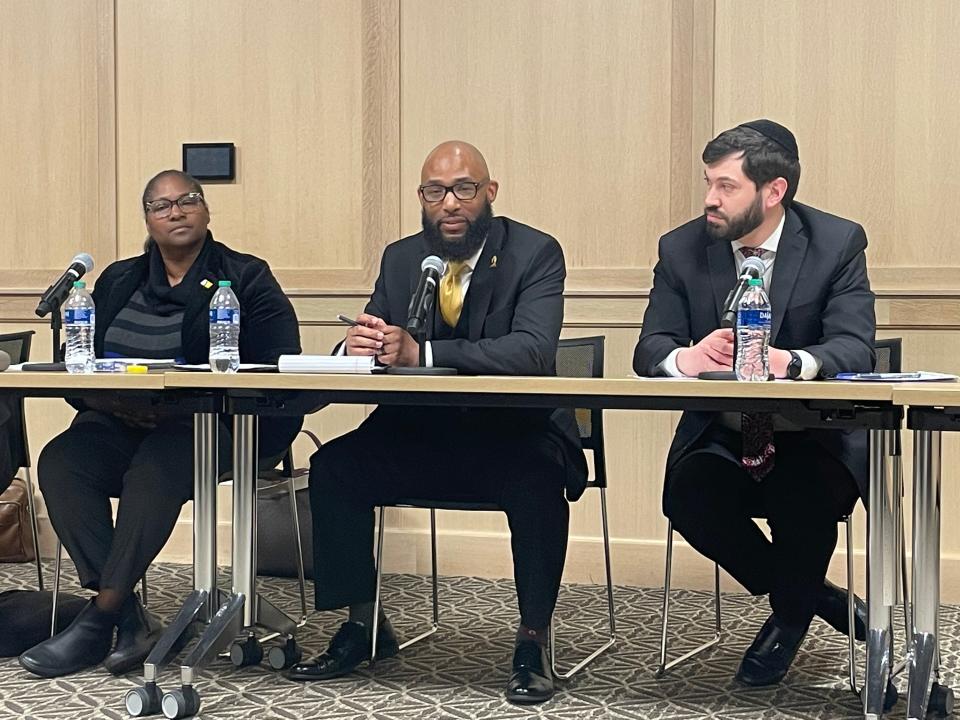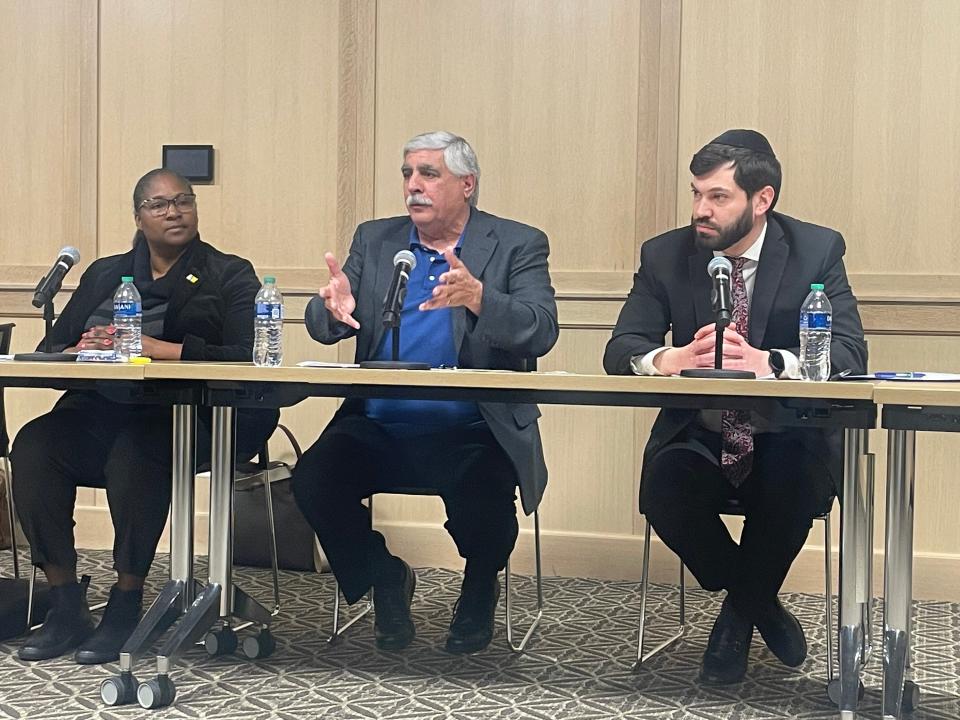South Bend police review board finalists prompt debate on value of policing experience
SOUTH BEND — By the end of this week, the South Bend Common Council plans to recommend up to three candidates to lead an office investigating complaints of police misconduct.
The update follows a more than three-hour public forum Monday night in which four finalists for director of the Community Police Review Office answered a lengthy set of questions submitted by residents. Each candidate's responses shed light on how their beliefs about policing may influence their work as liaison between the South Bend Police Department and the community.
The finalists show a natural split: Two have backgrounds in law enforcement but little familiarity with South Bend. Two are South Bend natives who lack policing experience but have worked in the community for years.
The council's choice will reflect how much value its members place on a director's knowledge of policing.
The purpose of a review office and the related Community Police Review Board, as outlined in a 2020 ordinance, is to examine formal complaints of police misconduct independently of SBPD’s internal affairs office. The nine-member board can make policy recommendations based on the review office director’s findings, but disciplinary action ultimately falls to the Board of Public Safety.
The finalists interviewed Monday night were Stephanie Ball, Charles King, Julius Rhodes and Matthew Topelian. Randy Peppers, an officer with the St. Joseph County Police Department, was selected to participate but was a “no-call, no-show,” according to Common Council President Sharon McBride.
McBride said the council will publicly discuss the candidates Wednesday at 6 p.m. in the Common Council chambers, on the fourth floor of the County-City Building. Residents are invited to listen in person or online via a link on the council's webpage, but there won't be public comment.
Under the ordinance, four members of the council — McBride, Vice President Sheila Niezgodski, Health and Public Safety Committee chair Eli Wax and immediate past president Karen White — will make their choice in a closed meeting afterward and file a resolution to be heard at the Monday council meeting. Councilors can vote to recommend no more than three finalists and leave it for the mayor to decide.
A major cause for delay in establishing the review office was the public outcry after The Tribune revealed that the initial director, Joshua Reynolds, had been suspended seven times during his tenure at the Indianapolis Metropolitan Police Department.
After City Clerk Dawn Jones refused to fire him and the Common Council drafted a policy shifting oversight to the mayor's office, Reynolds stepped down amid pressure from community members and local politicians.
Following the public debacle, South Bend Mayor James Mueller urged councilors not to rush the process, saying in his April 2022 State of the City Address: "Because it is critical that we get this right, we shouldn’t rush to meet arbitrary deadlines."
"With fewer than one filed complaint per week," he added, "we have time to find the right person to be the next director."
How the four finalists stack up
A top concern among residents Monday was whether prior experience in policing would be beneficial or detrimental to a future director.
Ball and King lack policing experience but hold prominent roles in South Bend organizations. Rhodes and Topelian don’t live in South Bend but spent years working in law enforcement in other states.

Ball is the vice president of the South Bend school board, of which she became a member in 2019. In her career, she’s worked on housing low-income tenants, most recently as the director of homeownership for South Bend Heritage Foundation, she said. She majored in sociology at Johns Hopkins University and later earned a master’s degree in public administration.
King, a pastor, has been director of urban youth services at YMCA of Greater Michiana since 2021. He’s a LaSalle High School graduate who, after taking some college courses, went on to work at Martin’s Super Market for more than 15 years.
Rhodes said he was an officer at the Kenosha Police Department for eight years before he moved to Indiana to be with his wife. He was also briefly a reserve officer at the Nappanee Police Department. He said he’s now a social worker at Real Services, a nonprofit that assists elderly, disabled and low-income people across northern Indiana.

Topelian, who lives about an hour southwest in Bass Lake, served in an array of law enforcement roles after earning his degree studying the industry.
Starting as an officer at the Houston Police Department, he said, he patrolled a high-crime area of the city and worked at a jail. He then spent the bulk of his career as an agent for U.S. Customs and Border Protection, including four years doing internal affairs investigations of officers involved in theft, drug-smuggling and bribery.

Residents question value of law enforcement experience
Some residents believe knowledge of police procedures is crucial to perform the director's role and to earn the respect of police officials.
But others prefer candidates with a proven commitment to South Bend and a philosophy that’s more sympathetic to Black residents, who inordinately face deadly encounters with police across the U.S.
Dante Kittrell shooting:Police, body camera footage depict moments leading up to South Bend police killing Dante Kittrell
Cheryl Ashe, a retired librarian who now volunteers to help ex-offenders re-enter the community, said Topelian is her favored candidate because of his extensive administrative and investigative experience.
“I don’t think we can rule out someone just because they have police experience,” Ashe said. “If that experience was in investigating other policemen or people in police-like jobs … it means he has the ability to investigate his fellow officers, which (would) not make him very popular.”
But the leader of the local chapter of the NAACP, Trina Robinson, said she worries what prejudices Topelian, the only white finalist and a longtime law enforcement officer, may hold against people of color. Reynolds, the initial director, was also white and had worked as a police officer.
Robinson said technical experience seems less important than a director who deeply understands the cultural dynamics of cities like South Bend. She said she highly recommends that Topelian isn't chosen.
Each candidate was asked what biases they may hold. All but Topelian conceded that they likely harbor some prejudice, either against law enforcement or certain demographics.
Rhodes, having worked as an officer for years, said that observing unfair traffic stops during his time in Kenosha served only to deepen his knowledge of the disparity between police and Black people.
Asked if his background left him susceptible to bias, Topelian said, "Not at all." He said he's learned to be undaunted and to "follow the evidence" regardless of the groups involved.
Topelian also shared his belief that defunding the police is "the worst mistake any city can do."
He worries about solid officers leaving police departments when their pay stagnates or when they perceive their city's mayor doesn't back them. Left in their wake, Topelian said, will be a force of less experienced officers.
"The bad (officers) we should be able to weed out," Topelian said. "Sooner or later they'll screw up, they'll do something illegal and they'll get fired."
Andrew Pierce, the director of justice studies at Saint Mary’s College, said he strongly discourages the councilors from choosing someone with a background in policing.
Otherwise, he fears, the Community Police Review Board could merely mimic the police department’s internal affairs office.
“They have this perception of themselves as being unbiased and neutral,” Pierce said of former law enforcement officers, “but an entire career working as a police officer is going to give you some deep-seated biases that you can’t just shed as you move into this new role.”
Email South Bend Tribune city reporter Jordan Smith at JTsmith@gannett.com. Follow him on Twitter: @jordantsmith09
This article originally appeared on South Bend Tribune: Locals debate: Does policing experience help or hurt review director?

